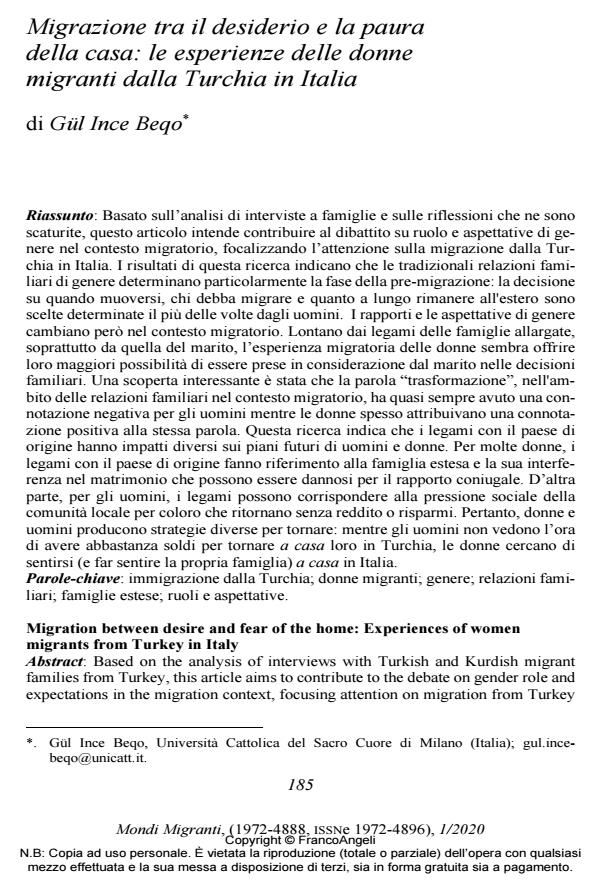Migration between desire and fear of the home: Experiences of women migrants from Turkey in Italy
Journal title MONDI MIGRANTI
Author/s Gül Ince Beqo
Publishing Year 2020 Issue 2020/1
Language Italian Pages 19 P. 185-203 File size 199 KB
DOI 10.3280/MM2020-001010
DOI is like a bar code for intellectual property: to have more infomation
click here
Below, you can see the article first page
If you want to buy this article in PDF format, you can do it, following the instructions to buy download credits

FrancoAngeli is member of Publishers International Linking Association, Inc (PILA), a not-for-profit association which run the CrossRef service enabling links to and from online scholarly content.
Based on the analysis of interviews with Turkish and Kurdish migrant families from Turkey, this article aims to contribute to the debate on gender role and ex-pectations in the migration context, focusing attention on migration from Turkey to Italy. The results of this research indicate that traditional gender family relation-ships determine particularly the pre-migration phase: the decision on when to move, who should migrate first and length of the stay abroad are determined often by men. However, gender relations and expectations change in the migratory con-text. Geographically being far from the extended families, especially from those of their husband, the migration experience seems to give more rights to the women to take part in family decisions. An interesting finding was, the word "transfor-mation", in the ambit of family relations in the migration context, was given a negative connotation by men while women often attached positive connotation to the same word. The findings indicate that, ties with the sending country have different impacts on men’s and women’s future plans. For many women, ties with the country of origin mean the relationship with in-laws and their interference in marriage may be harmful for the marital relationship. On the other hand, for men, ties may corre-spond to social pressure of the local community for those who return without in-come or savings. Therefore, women and men produce different strategies about returning: while men cannot wait to have enough money to go back to their home in Turkey, women try to feel (and make their family feel) at home in Italy. .
Keywords: Migration from Turkey; women migrants; gender; family ties; extended families; roles and expectations
- Friendship and migration: rethinking friendship with Turkish immigrants in Italy Mustafa Demirtaş, Pierluigi Musarò, in International Review of Sociology /2025 pp.1
DOI: 10.1080/03906701.2025.2577480 - Reimagining the homeland: diasporic belonging among Turkish and Kurdish second generations in Italy Gül Ince-Beqo, Maurizio Ambrosini, in International Review of Sociology /2022 pp.483
DOI: 10.1080/03906701.2022.2121118
Gül Ince Beqo, Migrazione tra il desiderio e la paura della casa: le esperienze delle donne migranti dalla Turchia in Italia in "MONDI MIGRANTI" 1/2020, pp 185-203, DOI: 10.3280/MM2020-001010